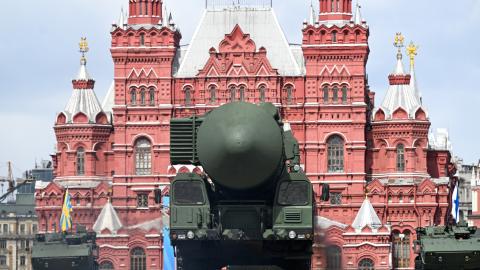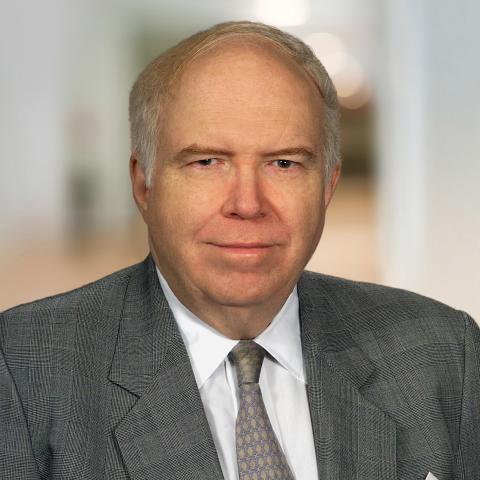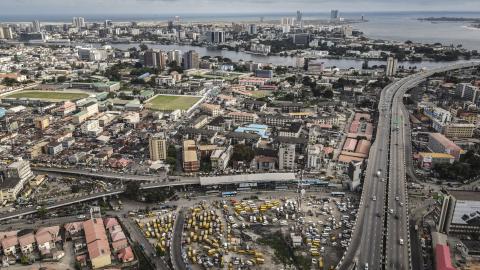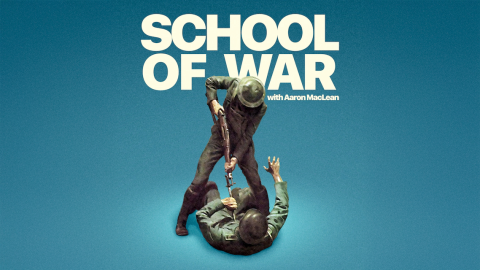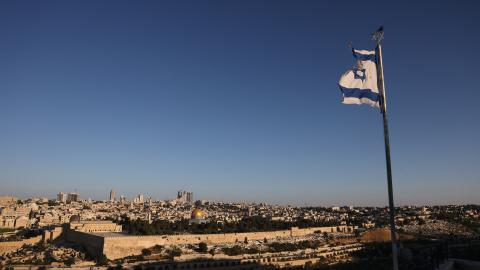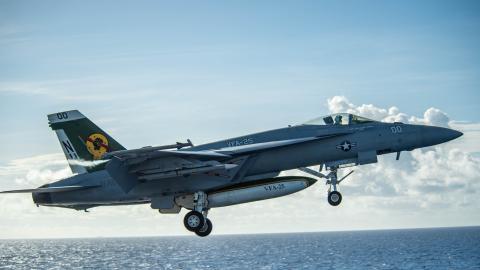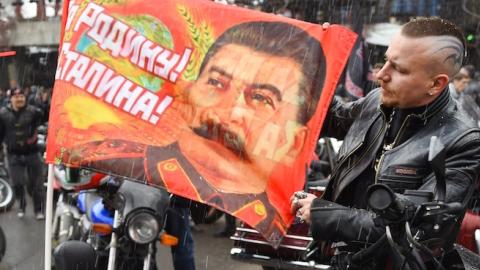Do you want to look like Joseph Stalin? There’s an app for that. The recently launched MSQRD lets users change their selfies to resemble, among other things, a bunny, a zombie, or a mass-murdering megalomaniacal dictator. Judging by the app’s popularity in Russia, it’s succeeded at capitalizing on the national mood. Stalin is back.
Long gone are the years when Soviet leader Nikita Krushchev meticulously de-Stalinized Soviet life. In 2015, the Soviet dictator’s resurrected cult of personality reached new heights. In May, Communist Party officials in Lipetsk erected a new Stalin bust. In July, the tiny village of Khoroshevo opened a museum focused on his military exploits. And in December, Communist activists in the central Russian city of Penza opened a “Stalin Center,” the goal of which is to “popularize and implement the practices that were in use during Stalin times and are still relevant today.”
None of this was mandated from above — but neither is any of it an accident. Over the last few years, President Vladimir Putin has presided over the rehabilitation of one of the 20th century’s greatest monsters. Bedeviled by the country’s economic decay and fearful of dissent, he has turned to the ghost of Stalin help to rally the Russian people and to prepare them for the sacrifices that lie ahead.
The social compact that framed Putin’s first two presidential terms (as well as his four years as prime minister) began to crumble some time around the time of his third presidential inauguration in 2012. The unspoken deal between Putin and the Russian people had gone something like this: He would relieve them from the instability and economic crises of the 1990s, and in return, Russians would allow him to run the country as he saw fit. For many years, this was a successful endeavor. The Russian people lived increasingly comfortable lives while Putin consolidated power. But the protests of 2012 and 2013 that followed his fraudulent reelection made it clear that, while many Russians enjoyed their economic success, some were no longer happy to leave politics to Putin.
So he changed tack, declaring in every medium he could find that the protesters were sponsored by Americans or inspired by the European Union. With the help of the state-controlled media, the Kremlin found and vilified an ever-growing list of fifth columnists: homosexuals, foreigners, NGOs, and activists. The message to the broader, non-protesting populace was clear: Russia and the Russian way of life were under attack, and Russia must unite around its leader to defend herself.
The message was given new urgency in 2014. The annexation of Crimea was sold to the Russian people as a defense of ethnic Russians from bands of homicidal, neo-Nazi Ukrainians. The war in Ukraine — which was blamed on western meddling — offered further proof that Russia was under threat. American and European sanctions only solidified the case.
So Putin asked Russians to tighten their belts for the sake of (pardon the expression) making Russia great again. Many Russians had seen a marked increase in their quality of life, but now they would be asked to give up some of those gains for the country’s greater geopolitical good. In this new social compact, economic growth must be sacrificed to help Russia reassert herself on the world stage.
To better make his case, Putin turned to Stalin’s playbook, looking increasingly to the events of World War II, known in Russia as the “Great Patriotic War.” Millions of Russians were killed during the Nazi invasion of 1941, and millions more lost their lives fighting Nazi Germany in Central and Eastern Europe. Nearly every Russian family — Vladimir Putin’s included — experienced loss, deprivation, disease, and death. It is a visceral, emotional part of the Russian historical fabric.
For this, the “victory over fascism,” the Russian people have been willing to forget and forgive the horrors of Stalin’s purges, his manufactured famines, his deportations, and his GULAGs. “Whatever atrocities Stalin committed, it is thought that his great accomplishments cannot be diminished, since Russia won the war under his guidance. It’s as though that makes up for his crimes,” explains Sergei Chapnin, until recently the editor of the Russian Orthodox Church’s official journal. And indeed, polling reveals that some 34 percent of Russians agree that “Whatever flaws and failures are attributed to Stalin, the most important thing is that, under his leadership, Russia was victorious in World War II.”
This is why the war is the perfect way for Putin to evoke the worldview he wants Russians to have — besieged on all sides, with only a great leader to save them. With this lens on history firmly in place, Putin has prepared the way for his own crimes, sins, and wars to be dismissed. All he needs do is maintain the charade that he is fighting for the good of Mother Russia, and Russians will be willing to overlook his failures.
And so re-Stalinization has sped ahead, with a focus on those wartime sacrifices. In November 2014 President Putin publically rehabilitated the Molotov-Ribbentrop Pact, which cemented a brief alliance between Hitler and Stalin in which they split eastern Europe between them — never mind the millions of Jews, Poles and others that were killed as a result. Under the Kremlin’s direction, school history books have been standardized to gloss over Stalin’s crimes. In a 2014 meeting with the authors of the new textbook, Putin noted how unfortunate it is that some textbooks describe Soviet rule over eastern Europe after the Second World War as a Stalinist occupation.
Likewise, he has defended the reappearance of statues of Stalin. In early 2015, one of Russia’s few monuments to the horrors of Stalin’s GULAG system, the Memorial Historical Center of Political Repression in Perm, was forced to close after being labeled a “foreign agent.” It was reopened by the local government a few months later with a new focus on the “role of the camps in contributing to the Soviet victory over the Nazis in World War II.” The popular media has followed Putin’s lead. The popular TV show Leningrad 46 examines life in the city in the aftermath of World War II, while the 2013 movie Stalingrad glorifies the sacrifices made in that historic battle.
And the push has been working. By March 2015, fully 45 percent of Russians believed that the sacrifices made by the Soviet people during the Stalin years were in some way justified. Less than three years earlier that number stood at only 25 percent. Further, a December 2014 poll found that 52 percent of Russians regard Stalin as having played a fully or generally positive role “in the life of [Russia],” a ten percent increase since 2006. In 2008, a nationwide TV poll saw Stalin named as the third greatest Russian to have ever lived.
Taken altogether, the message to the Russian people is clear: Just as Stalin did, Putin will take whatever steps he deems necessary to defend the country. There may be collateral damage, but trust him — it’s for the good of Russia.
It’s no wonder then that the Russian people seem largely unperturbed by their president’s actions in recent years. Few seem terribly upset that free media is nearly dead in Russia, nor that many of their fellow citizens have gone into exile because of political pressure. Neither are the arrests and prosecutions of protesters, or Russia’s role in bloody conflicts in Ukraine and Syria, of much concern.
Just as their grandparents did in Stalin’s time, most Russians seem ready to do whatever Putin asks of them as long as he delivers — or can convince the public that he has delivered. His gambits in Ukraine and Syria have successfully reinserted Russia into the international conversation. Whether he succeeds in convincing Russians that the price they’re paying for his adventures is worth it will determine how long his system survives.
